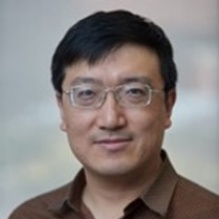Bin Wang
Conoco-DuPont Professor
University of Oklahoma
School of Sustainable Chemical, Biological, and Materials Engineering
Defects engineering to promote selective chemical transformation
Abstract
Interfacial charge transfer plays a valuable role in breaking and forming chemical bonds in materials and molecules, and in many cases such charge transfer is mediated by point defects, such as vacancies, at the interface. Here two case studies will be discussed, through which we show that, by introducing oxygen vacancies in two different systems - light-driven plasmonic CO2 reduction over Cu2O and electro-oxidation of methanol over NiOOH, the catalytic activity and selectivity can be controlled. Through electronic structure calculations, we show that in plasmonic CO2 reduction the non-equilibrium energized electrons, generated through direct interfacial charge transfer, may be responsible for the observed rate enhancement in C-O bond cleavage. In electro-oxidation of methanol over NiOOH, we show consumption of methanol yields formate as the major product while increasing potential drives further oxidation of formate to (bi)carbonate. Different from Pt-based catalysts, the stability of intermediate species is modified by the presence of oxygen vacancies, driving the reaction to produce carbonate, bypassing the CO route.
Bio
Bin Wang is a Professor, Conoco-DuPont Professor in the School of Sustainable Chemical, Biological, and Materials Engineering at the University of Oklahoma. He also holds a visiting professor position at the Lawrence Livermore National Laboratory. He received a PhD in chemistry from the École Normale Supérieure (ENS) de Lyon supported by a Marie Curie Fellowship from the European Commission. Prior joining OU in 2014, he was a postdoctoral research associate in physics at Vanderbilt University. His research is focused on computational simulations of nanoscale materials and their applications in catalysis, optoelectronics, and batteries. He received a DOE Early Career award, an ACS COMP OpenEye Outstanding Junior Faculty Award, the Young Scientist Prize at the 10th ACSIN International Conference, and OU Regents’ Award for Superior Research and Creative Activity. He has also been included in “Influential Researchers” by ACS I&EC Research.
Wednesday
February 7, 2024

Bin Wang
Conoco-DuPont Professor
School of Sustainable Chemical, Biological, and Materials Engineering
University of Oklahoma
- Time: 11:00 AM
- Location: 206 Furnas Hall